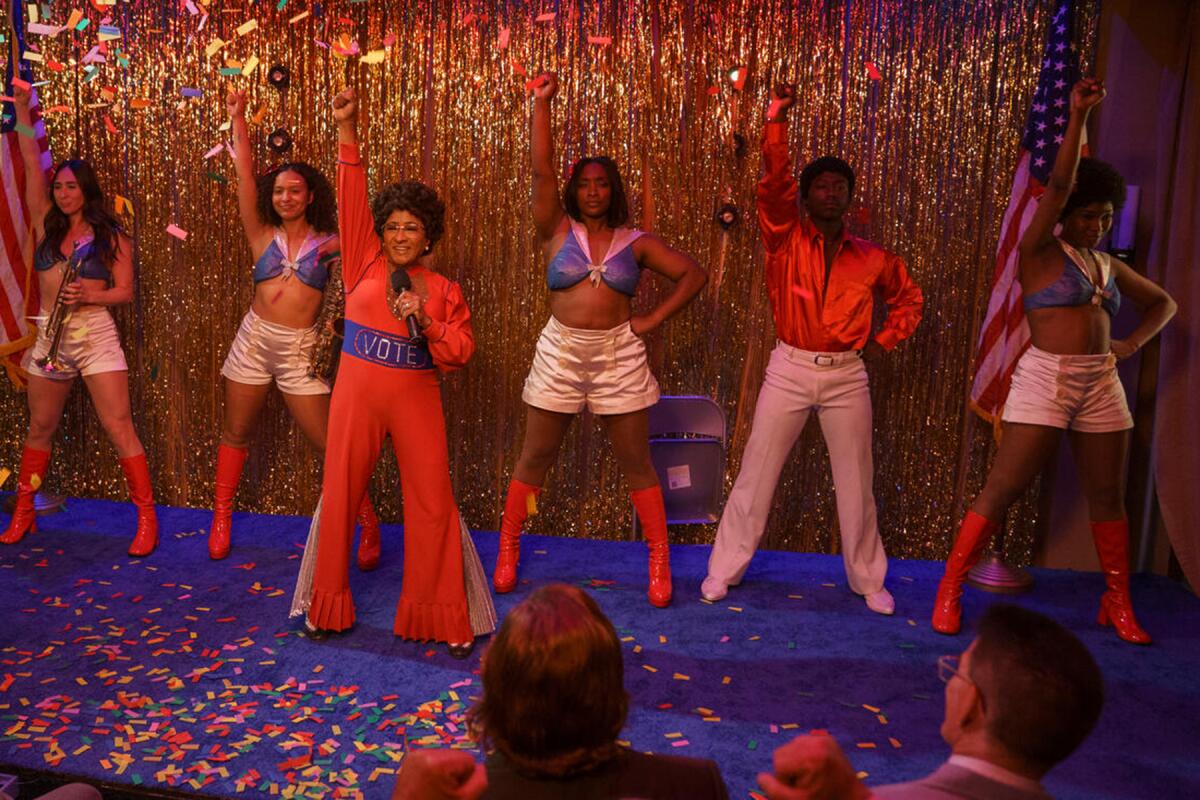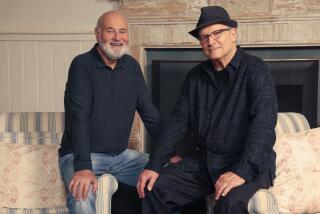‘History of the World, Part II’ review: The school of Mel is in session

If you don’t count the years when he worked as a drummer, a “tummler” and a teenage comic in the Catskills, Mel Brooks began his show business career in television, writing for Sid Caesar at the dawn of the medium. He returned in the mid-1960s to co-create “Get Smart,” and now he is back again, with Hulu’s “History of the World, Part II,” a sequel to his 1981 film “History of the World, Part I.”
That film, a series of sketches set in the Stone Age, ancient Rome, the Spanish Inquisition and Revolutionary France, is not the one by which he will be best remembered, or would likely want to be, but it is the one Brooks movie that suggests a second edition, with the possibility built into the title. Given that it is among his lesser films, I was not at all sure what to expect from the series, and though it takes a moment to get up on its legs, once it established its rhythms and breadth, I was completely sold.
“The History of the World, Part II” is both a sequel and a redemption — vulgar, funny, fun and smart about history and the modern world. It has been made with (and one might guess primarily by) other, younger hands — well, they would have to be, given that Brooks is 96 — but it’s recognizably School of Mel, with an added air of tribute and celebration.
Most notable, and most visible, among his new collaborators are Ike Barinholtz, Wanda Sykes and Nick Kroll, who take a number of roles throughout the show’s eight episodes. All are credited as executive producers and writers (as is Brooks, or “American treasure Mel Brooks,” as he introduces himself), and with its mix of short pieces and longer, intercut continuing stories, its media and social media parodies, it formally resembles Kroll’s great “Kroll Show.” (Kroll himself is the series’ most Brooksian presence, especially in his role as a shtetl purveyor of mud pies, though he also pays homage to Gene Wilder’s “I’m hysterical” scene from “The Producers.”) Brooks, who starred in the movie (“maybe a mistake,” he admits at the top), does not appear on screen here, at least not in his own body, but he narrates, in a customary tone of excitement, and his voice alone — a cultural memory running back 62 years to when he and Carl Reiner first took their “2000 Year Old Man” routine public — does much to set the stage.
Make no mistake: However many minds joined in, this is a Mel Brooks production. The hallmarks of his style are here: historical figures treated in a modern vernacular, established with “the 2000 Year Old Man”; disrespect for the lines between stupid and clever, subtle and ridiculous; exuberant musical numbers; the actors’ metafictional awareness that they’re in a show (and the sense that everybody’s in show business); silly puns; and a rich strain of Jewish humor, which is to say humor written not just by Jews but also about Jews. (There’s less of that around than you might think, given that we run Hollywood — I kid, letter writers.) There are fart jokes, pee jokes and vomit jokes — the last of which, I surprise myself relating, is the basis of a particularly and funny bit set on D-Day.
Some would certainly find the series blasphemous, given its several takes on Jesus — also an early subject of “the 2000 Year Old Man” — in parodies of “The Notebook,” Peter Jackson’s Beatles documentary “Get Back” and a spot-on “Curb Your Enthusiasm,” with J.B. Smoove doing a brilliant turn on his Leroy as the apostle Luke and Kroll as a Larry David-ized Judas (with Richard Kind as Peter, aggrieving Judas by not comping him a ticket for his one-man show “My Father’s Galilean, My Mother’s a Moabite & I’m in Therapy”). Plus, there is a riff on the AD 325 Council of Nicea, in which the bishops agree to henceforth represent Jesus as white (he’s been played by the Black actor Jay Ellis) and to blame the Jews for killing him. The man who wrote “Springtime for Hitler” is not about to soften his brand at 96; for his disciples, it’s an opportunity to get in on a bit of that action. (Hitler is back in the series “On Ice,” a brief bit from the movie blown out into a longer one.)
Where “Part I” was peopled with a contingent of already-older comics, including Henry Youngman, Shecky Greene, Jackie Mason and Jack Carter, as if a table from the Friars Club had one day just decided to remove itself to a studio backlot, “Part II” teems with faces from a couple of generations of contemporary comedy and comedies. (One imagines them getting the message, “Mel Brooks — you’ll want to be in on this,” and clearing the calendar to make sure they were.)
Among the sizable cast, in roles larger and smaller, are Pamela Adlon (singing and dancing and preaching revolution in 1918 Russia), Danny DeVito (as the Romanov czar, with a family out of Beverly Hills), Josh Gad (as Shakespeare, the terror of his writers room), Zahn McClarnon (as a Native American soldier in the Civil War — “the one in the 1860s,” says Brooks, “not the one coming up in 2024” — with a yen to do stand-up), Kumail Nanjiani (as the author of the Kama Sutra, originally a cookbook), Ronny Chieng (as Kublai Khan), Zazie Beetz (as Mary Magdalene), Jack Black (as Josef Stalin), Fred Armisen (flogging a pyramid scheme, with actual pyramids, in ancient Egypt), Marla Gibbs (in a ‘70s-style sitcom featuring Sykes as Shirley Chisholm), Natalie Morales, Sarah Silverman, Paul Scheer, Arturo Castro, Jon Daly, Jason Alexander, Andrew Rannells, Reggie Watts, Rob Corddry, D’Arcy Carden, Jason Mantzoukas, Jillian Bell and, from “Abbott Elementary,” Quinta Brunson and Tyler James Williams (plus Janelle James among the writing staff). There are more.
As popular as it’s been across the decades, Brooks’ work, on its low or high end, isn’t for everyone; the easily offended need not apply. (For the situationally offended, the next good sketch may erase the bad flavor of the last.) “Part II” is typically rude, crude, dumb, learned, erudite and delightful, by turns or even all at once, and it’s perhaps the only television series that would dare, or even find occasion to make a joke about a pop vocal group called Bolsheviks to Mensheviks. Which is good enough for me, and maybe for you.
‘History of the World Part II’
Where: Hulu
When: Any time
Rating: TV-MA (may be unsuitable for children under the age of 17)
More to Read
The complete guide to home viewing
Get Screen Gab for everything about the TV shows and streaming movies everyone’s talking about.
You may occasionally receive promotional content from the Los Angeles Times.







